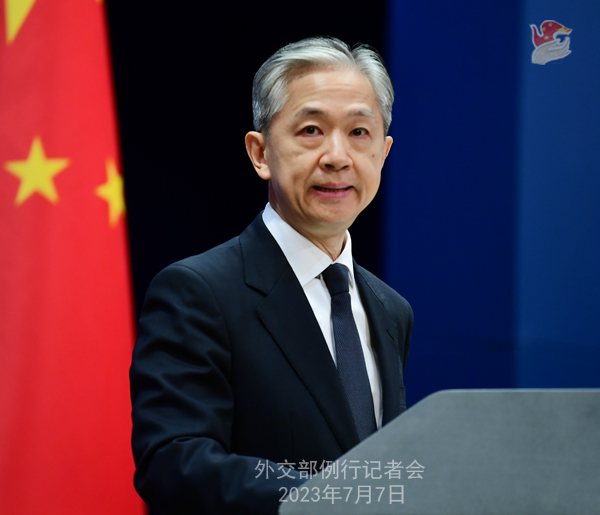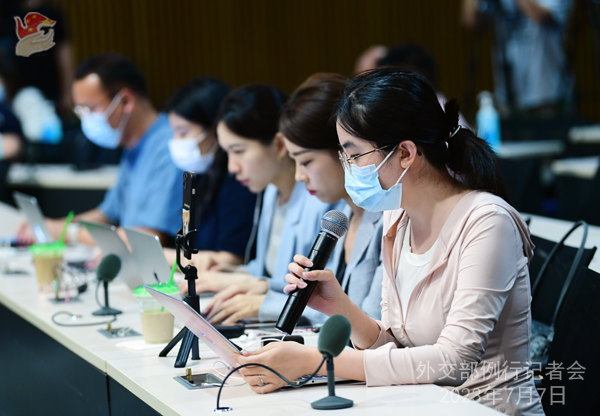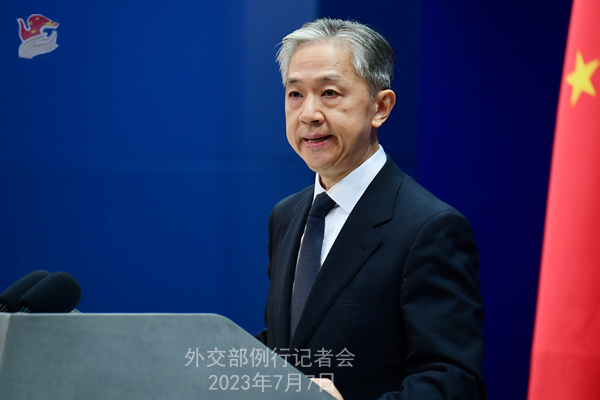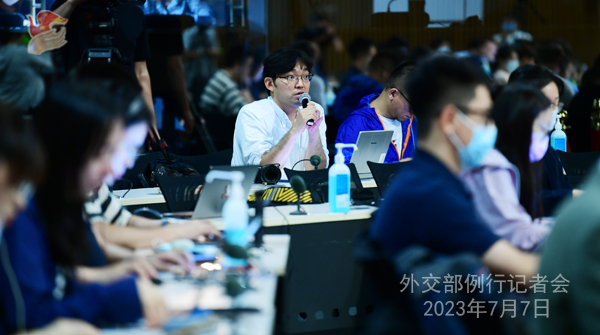| Foreign Ministry Spokesperson Wang Wenbin’s Regular Press Conference on July 7, 2023 |
| 2023-07-07 20:06 |
|
China News Service: According to reports, President Xi Jinping on July 6 sent a congratulatory letter to an event commemorating the 70th anniversary of the “Icebreaking Mission” in China-UK trade. It has been warmly received in the two countries. Could you further elaborate on this? Wang Wenbin: On July 6, the event commemorating the 70th anniversary of the “Icebreaking Mission” in China-UK trade was co-hosted by China Council for the Promotion of International Trade (CCPIT), the 48 Group Club of the UK and the China-Britain Business Council. President Xi Jinping sent a congratulatory letter, Vice President Han Zheng attended the event and representatives of the business community of the two countries participated. President Xi Jinping in his congratulatory letter pointed out that 70 years ago, British entrepreneurs represented by Jack Perry, keenly seeing the bright future of New China and the huge potential of China-UK cooperation, broke the ice of ideology with courage and resolve, and took the lead in opening up the channel of China-UK trade exchanges. Over the past seven decades, generations of “icebreakers” have witnessed and actively participated in China’s development and reform, and achieved their own development and growth through mutually beneficial cooperation. It is hoped that people of vision from all walks of life in China and Britain will carry on the pioneering spirit of vision, openness and cooperation, work hard to break new grounds for win-win cooperation, promote the building of an open world economy, and make greater contributions to promoting China-UK friendship and cooperation. The fundamental reason of the steady growth of the “icebreaking spirit” in the past seven decades is that people of vision in China and the UK always keep up with the times, seize historic opportunities and work together proactively. As we speak, the world faces multiple challenges. Economic globalization is confronted with headwinds. “Erecting walls or barriers”, “decoupling or disrupting supply chains”, “de-risking” and other rhetoric are rising. Difficult moments call for more vision and courage of the “icebreakers” and efforts of rising above disturbances and deepening cooperation. China will stay committed to high-level opening-up and continue to work with all sides to jointly seize huge opportunities presented by Chinese modernization, share in the development dividends and make new contribution to the recovery and growth of the global economy. Hubei Media Group: The UN Security Council held an open debate on the Iranian nuclear issue on July 6. The UK, France and Germany issued a joint statement following the meeting, claiming that Iran has been in violation of its nuclear commitments under the Joint Comprehensive Plan of Action (JCPOA) as its nuclear program has been escalating, and that Iran’s development of ballistic missiles and transfer of UAVs to Russia breached UNSC Resolution 2231. The three countries expressed deep concerns that restrictions of UNSC Resolution 2231 on Iran’s ballistic activities and missiles transfers will expire in October this year. What is China’s comment? Wang Wenbin: We noted the joint statement issued by the UK, France and Germany. I would like to stress that relevant provisions of UNSC Resolution 2231 should be interpreted accurately and implemented in its entirety. This bears on the authority and efficacy of UNSC resolutions. The core of UNSC Resolution 2231 is implementation of the JCPOA. The crux of the current situation is that the US unilaterally withdrew from the deal and resorted to maximum pressure on Iran, to which Iran responded with countermeasures. The most pressing task at hand is for all parties to resume full and effective implementation of the JCPOA through dialogue and negotiation, avoid taking any step that might escalate tensions or sharpen differences, and create conditions for diplomatic efforts. China will continue to communicate and coordinate with relevant parties to bring the JCPOA back on track at an early date, safeguard the authority and efficacy of UNSC Resolution 2231, and promote the political and diplomatic resolution of the Iranian nuclear issue.
Bloomberg: US Defense Secretary Lloyd Austin held a call with his Philippine counterpart Gilberto Teodoro. And after that call, Austin said that Beijing’s conduct in the South China Sea was “coercive and risky.” Austin also reiterated the US’s commitment to defending the Philippines. How does the ministry respond to that? Wang Wenbin: I stated China’s position yesterday and would like to reiterate that the legitimate and lawful law enforcement activities of China Coast Guard in waters under China’s jurisdiction is beyond reproach. The US’s commitment to the defense of the Philippines should not undermine China’s territorial sovereignty and maritime rights and interests in the South China Sea. The remarks of the US side distorted and discredited China’s legitimate and lawful maritime law enforcement activities in an attempt to sow discord among countries in the region. China firmly opposes this, and the US’s attempt will never succeed. Kyodo News: US Treasury Secretary Janet Yellen is in China for a visit. According to reports, she plans to have talks with Premier Li Qiang. Could you share any information on this? Wang Wenbin: Relevant official of China’s Ministry of Finance has responded to reporters’ questions concerning US Treasury Secretary Janet Yellen’s visit. As for the specific program of her visit, the Chinese side will release information in due course. You may keep an eye on it. CCTV: It was reported that IAEA Director General Rafael Mariano Grossi acknowledged disagreements over the IAEA’s comprehensive report among international experts involved in the review of the handling of nuclear-contaminated water at the Fukushima Daiichi Nuclear Power Plant. Chinese experts involved in the review have expressed regret over the IAEA’s comprehensive report. What is your comment? Wang Wenbin: I noted the remarks of the IAEA Director General and the views of relevant experts. This once again shows that the hastily released IAEA report does not fully reflect the views of all experts from various parties who have participated in the review. Relevant conclusion is one-sided and has its limitations, and it failed to address the world’s concerns over the plan of discharging the nuclear-contaminated water from the Fukushima Daiichi Nuclear Power Plant into the ocean. The IAEA Director General has said that the IAEA will not endorse the discharge of nuclear-contaminated water into the sea by any country. China urges Japan to give up using the IAEA report as the “greenlight”, stop pushing through the discharge plan and handle the nuclear-contaminated water in a responsible way.
Bloomberg: The Biden administration has called on China to do more to combat the spread of illicit synthetic drugs. It also said the US has seen no sign that China plans to join a coalition of some 84 countries that will work to disrupt the spread of fentanyl and other drugs. How does the foreign ministry respond to that? Wang Wenbin: As has been our consistent position, China takes an active part in international counter-narcotics cooperation, and at the same time firmly opposes smearing and attacking other countries or imposing unilateral sanctions on other countries in the name of counter-narcotics. We urge the US to take concrete actions to undo its wrong moves and create conditions necessary for China-US counter-narcotics cooperation. Dragon TV: According to reports, Japan’s Chief Cabinet Secretary Hirokazu Matsuno said yesterday that Chinese and ROK nuclear power plants had released into the sea liquid wastes with relatively high concentration of tritium. The standard Japan sets in this regard is much stricter than other countries including China and the ROK. Japan will explain its plan of releasing the Fukushima nuclear-contaminated water into the sea to China based on science. Do you have any response? Wang Wenbin: Japan deliberately compares the Fukushima nuclear-contaminated water with water released by nuclear power plants in normal operation across the world. With such disguised replacement of concept, it is seeking to mislead public opinion. It doesn’t take an expert to see the fundamental difference between the nuclear-contaminated water that came into direct contact with the melted reactor cores in the Fukushima nuclear disaster and the water released by nuclear power plants in normal operation, the latter never having direct contact with reactor cores. No comparison can be drawn between the two as they come from different sources, contain different radionuclides and require different levels of sophistication to handle. In particular, the IAEA didn’t assess the efficacy and long-term reliability of Japan’s treatment facilities and therefore cannot guarantee that all nuclear-contaminated water will be up to standard after treatment in the next 30 years. Japan’s attempt to make an issue of normal water discharge from operating nuclear power plants is aimed at whitewashing its ocean discharge plan and misleading the international community under the disguise of science. We have also noted that Japan has devised other tricks to sell the nuclear-contaminated water as something safe and harmless, for example, by launching a cute mascot representing radioactive tritium and coining the pseudo-scientific term “treated water.” Its sole purpose is to downplay the hazard of the nuclear-contaminated water. But no matter how Japan tries to dress up the ocean discharge plan, it’s impossible to get away with it under the sharp eye of the world. No matter what Japan says, the nuclear-contaminated water cannot be turned into normal water, nor can Japan walk away from the consequences and responsibility of dumping the water into the sea. Once the water is released into the ocean, there is no way to take it back. It’s like opening Pandora’s box. We urge Japan to stop shifting responsibility, earnestly respond to the international community’s legitimate concerns, stop pushing forward the ocean discharge plan, and handle the nuclear-contaminated water in a truly science-based, safe and transparent manner after conducting thorough consultation.
|
 | ||||||||||||
 | ||||||||||||
|



